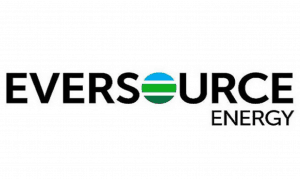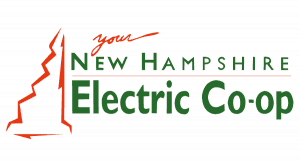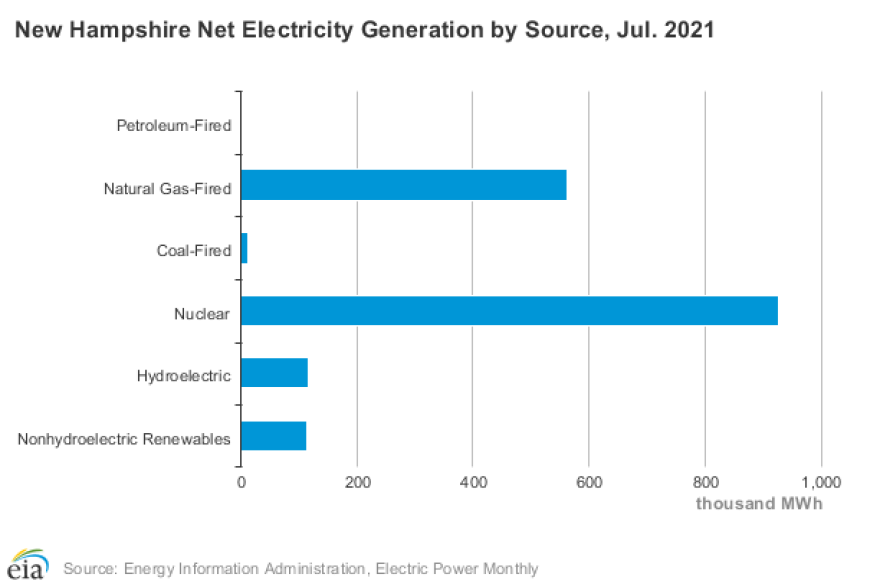New Hampshire Residential Electric Rates

New Hampshire’s major electric utility, Eversource Energy, provides electricity delivery service and default generation service.
Eversource Energy continues to manage and control the delivery portion of the electricity (lines and wires) but is no longer in the business of providing the lowest possible electric rates. Instead, they offer a default rate called the Price to Compare. Price to Compare rates changes twice annually. Low Competitive Rates in New Hampshire are available below. The competitive rate replaces the Price to Compare on your Eversource Energy electric bill.
New Hampshire Energy Market Overview
The average residential electricity rate in NH is $0.2329 per kilowatt hour, which is among the highest in the country. If you compare it to the other states’ average electricity rate of $0.1609 per kilowatt-hour, there is certainly room for improvement. The introduction of renewables, as well as storage options could provide more energy, at lower prices and help stabilize the energy sector in the state.
Energy Deregulation in New Hampshire
The efforts to combat high electricity prices by deregulating the NH energy sector started in the mid-1990s, but it wasn’t until 2003 that an actual competitive marketplace was formed. The deregulation introduced a new era where businesses and homeowners could freely shop for electricity rates and switch in a fast way towards competitive, more convenient electric suppliers.
The electricity generation in New Hampshire is predominantly nuclear, followed by natural gas-fired and renewable sources. Still, in 1996, the deregulation meant that new players could enter the field and ensure fair pricing, equal rights, and lower electricity prices. The fact is that the energy is still expensive, at $0.2329 per kWh, but the introduction of more renewables is likely to offset a portion of these costs. Another thing with deregulation is that you can choose your provider depending on the region you live in. If you make no choice, you will be given a default energy provider.
Utility Companies in New Hampshire
Four electric distribution companies operate in New Hampshire, each serving a mutually exclusive territory. They include:
Eversource Energy (Eversource)

A subsidiary of Northeast Utilities, Eversource serves approximately 70 percent of the retail customers in New Hampshire from southern, urban areas to northern, rural areas of the state.
- Customer service number: 1-800-662-7764
- Current standard electricity rate: 22.57 ¢ / kWh
Liberty Utilities (Liberty)

Liberty provides electricity to residential customers in the western and southern areas of the state, covering approximately 6 percent of the retail customers in New Hampshire.
- Customer service number: 1-800-375-7413
- Current standard electricity rate: 14.74 ¢ / kWh
Unitil Energy Systems, Inc. (UES)

Unitil, along with its two subsidiaries, Exeter and Hampton Electric Company jointly serve approximately 11 percent of New Hampshire’s electricity customers in both the Seacoast and Capital areas.
- Customer service number: 1-800-852-3339
- Current standard electricity rate: 17.58 ¢ / kWh
New Hampshire Electric Cooperative, Inc. (NHEC)

NHEC provides electric service to about 11 percent of retail customers throughout the central part of New Hampshire.
- Customer service number: 1-800-698-2007
- Current standard electricity rate: 6.4 ¢ / kWh
Utility Companies vs. Energy Providers
Utility companies and energy providers are two different types of companies. Utility companies are responsible for the hardware that provides power to your home, including power lines, transformers, electrical infrastructure breakers, and other technical equipment. They also maintain the electrical infrastructure in case of damage from storms, windstorms, or tree branches. If any of this happens, the utility company’s responsibility is to fix the damage and make sure that your energy provider can keep sending you electricity. The utility company also ensures there is enough capacity to meet demand, both short-term and long-term speaking. This work is paid for by the delivery fees portion on your electricity bill.
Energy providers receive the electricity from the grid and then deliver it to your home. This is the company you sign your electric contract with and the electricity company to which you pay for the electricity. This is also the company that enables you all the perks and benefits that you receive with your energy plan. So, in a nutshell, while the utility company sets up the infrastructure, your power provider actually purchases power for your home.
Energy Plans & Products in New Hampshire
Energy plans are like shoes. One size does not fit all. Navigating through complex information about electricity rates is a process that can be confusing and can ultimately deter you from shopping for a better deal. Below is all you need to know about the different energy products that energy companies offer to the residents of New Hampshire:
| Plan | Description | What's Good? | What's Bad? |
|---|---|---|---|
| Green / Renewable Energy | On this plan, your supplier will match the energy you consume by buying an equal amount from renewable generators |
|
|
| Variable Rate | Your per-unit gas and electricity costs can vary at the discretion of your supplier |
|
|
| Fixed Rate | Your unit price for gas and electricity will remain the same for the duration of the plan |
|
|
New Hampshire Energy Plans
Energy plans and electricity providers can vary significantly based on your location. It’s important to compare the different electricity plans offered in your area in order to find the one that best suits your needs. There are a few things to keep in mind when doing so, such as the type of plan (fixed-rate or variable-rate), the early termination fee, and any green energy options.
Fixed-rate plans are typically the best option for New Hampshire power users, as they offer stability and Predictability. Variable-rate plans, on the other hand, can offer significant savings if the market price of electricity happens to drop. Green energy plans are the best option for eco-conscious power users, as they help to offset your carbon footprint. Let’s dive right in, as there are more types of energy plans in New Hampshire:
- Fixed-rate plans,
- Variable-rate plans,
- Renewable energy plans,
- Prepaid energy plans,
- Time-of-use energy plans,
- Solar plans,
- Average-billing plans,
- Pay-as-you-go energy plans,
- No deposit plans, and
- Commercial or business energy plans.
Fixed-Rate Plans
A fixed-rate energy plan is a good option for consumers who want to choose stable, predictable electricity rates. These plans are usually signed for a fixed period, from six months to three years. The main advantage of a fixed-rate plan is that your rates will not change during the course of the plan’s duration, no matter what happens with the energy market. So you can rest assured that your rates will stay the same even if there are disruptions to the energy supply.
Variable-Rate Plans
Although a variable-rate plan may have a lower baseline electricity rate, they are subject to market fluctuations that could result in higher rates. We advise our customers against getting variable-rate plans to protect them from potentially high energy prices. Most people who had issues with their monthly electric bills during the Texas blackout had variable rate plans.
A variable-rate plan could help you save money on your energy bill during spring and autumn when energy demand is typically lower. However, your energy prices could spike during winter and summer, when energy demand is high and supply is relatively low. This may be a good option for those who have very energy-efficient homes or another source of heat.
Renewable Energy Plans
Renewable energy plans are becoming increasingly popular in New Hampshire. These green energy plans provide clean energy for your home using renewable resources like solar and wind power. Green energy plans often have a slightly higher price tag than traditional electricity plans, but offer substantial environmental benefits, and, with higher energy efficiency, can even cost less than conventional plans. Indeed, as the state needs to reduce its rates to help people save money, it is necessary to always work on energy efficiency and decrease energy use in New Hampshire.
Although nuclear power is not a renewable resource, many states continue to use fission plants because they do not release any carbon dioxide into the atmosphere. If you’re interested in doing your part to reduce your carbon footprint, a green energy plan is a great option. You may want to avoid nuclear energy as well, as it is green, but non-renewable at the same time.
Prepaid Energy Plans
If you know exactly how much energy you’ll need in a given month, a prepaid plan is the best solution. You pay for your expected usage at the beginning of the month, then use that fixed amount of electricity for the rest of the month. Prepaid plans are becoming more popular because they offer great flexibility and no minimum contract duration. You only pay for what you use.
Time of Use Plans
Time of Use plans has variable rates that change throughout the day, usually at 5-minute intervals. If you decide on this type of plan, you should know that the price of energy is set by the utility companies, not the plan provider, to a large extent. However, these plans are still a great way to save money on your electric bills.
The savings come from the fact that these plans typically include both the most expensive and cheapest electricity rates. In some areas, depending on your ZIP code, they can also include periods of the day when the energy is free. If you use appliances during this time, you can see significant savings on your electric bills.
Solar Plans
A solar energy plan is a great option for those who have installed solar panels and want to take advantage of green energy and the cheapest electricity rate. This type of New Hampshire energy plan allows you to send all the power you produce but don’t consume back onto the grid. If you have solar panels, you can check solar plan availability in your area by going to Electricrate and entering your ZIP code.
If you also plan to install your own panels and reduce the cost of electricity even further depending on the insolation in your area, you should check if the utility company in your NH area can support net metering. This way, you will be able to reduce your bills even during the night, as you continue to use power after the sun is down.
Average Billing
Electricity providers offer an average billing plan to help customers budget their electricity usage. With average billing, your monthly electricity rate is calculated based on your usage over the course of a year. This way, you always pay the same amount of money for different electricity usage, even as seasons fluctuate.
Your electricity bill is calculated by taking your annual electricity usage and then dividing it by 12. This is the price you pay monthly. Adjustments are made once a year, usually in October. These plans are a great solution for those who want to have fixed electricity expenses.
If you’ve paid more electricity than you’ve used, you are eligible for compensation. If you’ve used more than you’ve paid, you pay the difference, and the energy price per month is recalculated for the next year.
Pay-as-You-Go Energy Plans
Pay-as-You-Go electricity plans are becoming increasingly popular, but it’s important to understand how they work before signing up for one. With a plan like this, you prepay for a certain amount of electricity. This money is then used to cover your energy usage for that month. If you run out of funds, your power provider will send you a notification letting you know that you need to replenish your balance. If there is money left over, it is rolled over to the next month. Pay-as-you-go converts all the funds in your account into credits that are deducted. One advantage of this type of plan is that you always know how much you’re going to pay for electricity since the rate is fixed.
No Deposit Plans
There are both pros and cons to no-deposit energy plans. On the plus side, there is no deposit required upfront. In addition to this, these types of plans offer bill control through upfront payments and allow customers to monitor their energy usage in real-time. However, some potential drawbacks include automatic shut-offs and higher than average electricity rates.
As no plan and no two consumers are created equal, and you only spend a fixed amount of power every month, a no-deposit plan is designed just for you. These plans do not have a credit history check and you will be able to purchase electricity in the easiest way. Some providers even let you top off the funds with prepaid cards, which is a helping hand in a lot of cases, as most homes do not have the same amount of money to budget with every single month.
Business/Commercial Energy Plans
Businesses need electricity to operate, and business energy plans are designed to meet those needs. These rates aren’t available online because each business gets a personalized quote. Businesses usually use more power than households, so they often get very low rates. Some business energy plans come with perks like free electricity at night, which can help offset the cost of security systems’ operation.
Renewable Energy Potential in New Hampshire
New Hampshire has a significant potential for renewable energy generation. Currently, it only produces 16% of its energy by renewable means.
Only a portion of their energy comes from solar. Investing more money into renewable options would give the people of New Hampshire a more reliable way to produce energy, fewer outages, and a lower energy price as a result. If you decide to move to New Hampshire, you should know that the energy price is as high as $0.2326 and that the state should increase solar energy utilization.
Eversource Electricity Plans and Rates in New Hampshire
New Hampshire customers can buy electricity at relatively low prices. Still, New Hampshire’s electricity prices are higher than the national average, and so is the monthly electric bill. For this reason, it is necessary to carefully consider all New Hampshire electric rates, renewable energy sources that are possible as an energy source for your home, and every energy supplier in your area. Only this way will you be able to offset a portion of the high cost of residential rates that this state offers.
Finding all the energy New Hampshire electric rates is one thing, but choosing the right one for you is another. To help find the right alternative (lower) energy rate for you and help keep the energy bill low, you should be able to:
- Know your energy demand, both in the summer and the winter,
- Know how energy efficient your appliances are because It might be possible to upgrade some of them,
- Know the difference in energy use in the winter and the summer – if the winter one is really high, you can consider not supplying heat to your home using electricity,
- Know what type of electricity you want – renewable or non-renewable – as generating electricity by means of renewable sources can come with its premium at times,
- Know if you live in an area vulnerable to weather extremes – choose a fixed-rate plan,
- If you have a very energy-efficient home, you may choose a time-based plan and use major appliances only during periods of low-priced electricity or free electricity. This way, you receive the power you need, while paying less,
- Once you have a rough idea of a few energy providers, before making any decisions, you should check them out online. A single review can mean more than a page issued by state regulators and can help you save on energy usage and reduce your bills.
Rates updated daily
| Provider | Plan Length | Rate |
|---|---|---|
| Direct Energy | 13 months | 8.29¢ / kWh |
| Direct Energy | 12 months | 8.39¢ / kWh |
| Direct Energy | 18 months | 8.69¢ / kWh |
| ENH Power | 24 months | 9.09¢ / kWh |
| ENH Power | 12 months | 9.19¢ / kWh |
| ENH Power | 24 months | 9.29¢ / kWh |
| Think Energy | 18 months | 11.70¢ / kWh |
| Think Energy | 24 months | 11.70¢ / kWh |
| Think Energy | 12 months | 12.00¢ / kWh |
| Think Energy | 6 months | 12.50¢ / kWh |
FAQs
Below are answers to some of the questions you might have about NH electricity rates:
How much Does Electricity Cost in NH?
What is the current Eversource rate in NH?
Currently, the Eversource Price to Compare or the price for the supply portion of your electric bill is 10.669 ¢ / kWh. Unfortunately, you cannot choose the electric utility company. What you can do to decrease your energy bill is to switch the power provider (check availability in your area), or you can even go for solar panels or a residential wind turbine to produce some of your electricity on your own.
Do Electric Rates go up in NH?
They do. In 2018, the Public Utilities Commission approved the supply charge to go up from 7.903 cents per kilowatt hour to 9.412 cents, so what you pay for electricity now on average is more than what it was a few years ago.
To switch to a cheaper electricity rate, just enter your zip code on our website to see available energy plans in your area. There are dozens of plans to choose from, so you will always be able to save.
Conclusion
If you live in New Hampshire or would select this as a place to move here, you should know that the state offers reliable electricity services. Once there, you should choose a good power provider and sign a contract with them. If you are moving into a new site, you should start looking for a power provider at least three weeks before your move-in date. This will give you enough time to learn about all the offers on the energy market and all the energy plan options.
Updated on

